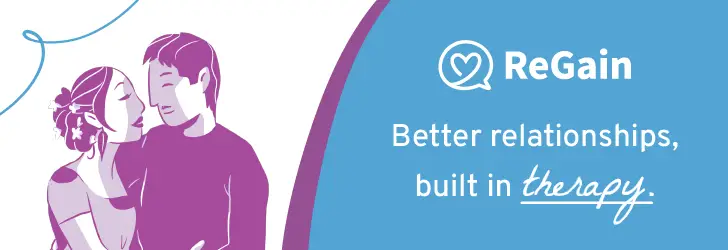As a BetterHelp affiliate, we receive compensation from BetterHelp if you purchase products or services through the links provided
Relationships can be both exciting and nerve-wracking. Feeling anxious when entering a new relationship or taking things to the next level is normal. However, this anxiety can become overwhelming for some individuals and impact their daily lives. This is known as relationship anxiety.
Relationship anxiety can manifest in different ways. Some people may feel constant worry or doubt about their partner or the relationship’s future. Others may experience physical symptoms such as nausea, headaches, or panic attacks. While it’s natural to have some concerns about a relationship, when these feelings interfere with daily life, it may be time to seek help.
Another factor that can impact relationships is gut feeling. This feeling is often described as an instinctual reaction to a situation or person. Some believe this feeling signifies something wrong or off about the situation. Others view it as an internal warning system that should be trusted. However, not everyone experiences this feeling, and it’s important to remember that it’s not always accurate.
Understanding Relationship Anxiety
What is Relationship Anxiety?
Relationship anxiety is a feeling of worry, fear, or unease that can arise in romantic relationships. It can manifest in various ways, including doubts about the relationship, fear of abandonment, or a constant need for reassurance from a partner.
While some anxiety is normal in any relationship, excessive anxiety can lead to negative consequences, such as decreased relationship satisfaction, decreased trust, and even the end of the relationship.
Physical Symptoms of Relationship Anxiety
Relationship anxiety can also manifest in physical symptoms, such as:
- Rapid heartbeat
- Sweating
- Trembling or shaking
- Shortness of breath
- Nausea or stomach upset
These physical symptoms can be distressing and uncomfortable and further exacerbate anxiety and worry.
It is important to note that relationship anxiety is a common experience, and many ways exist to cope with and manage these feelings. Seeking support from a therapist or counselor can be a helpful step in addressing relationship anxiety and improving overall relationship satisfaction.
Causes of Relationship Anxiety

Relationship anxiety is a common experience many people face in romantic relationships. It can manifest in various ways, such as doubting the connection, worrying about the future, or feeling insecure. Understanding the causes of relationship anxiety can help individuals work through their feelings and improve their relationships.
Previous Relationship Experiences
Previous relationship experiences can significantly impact an individual’s current relationship. If someone has experienced betrayal or heartbreak in the past, they may be more likely to doubt their current partner’s intentions or worry about being hurt again. Memories of past relationships can also trigger relationship anxiety, even if the current partner has done nothing to cause it.
Insecurity and Self-Doubt
Individuals who struggle with insecurity and self-doubt may be more prone to relationship anxiety. They may worry that they are not good enough for their partner or that their partner will leave them for someone else. This can lead to a lack of trust in the relationship and an inability to connect with the partner fully.
Compatibility and Connection
Compatibility and connection are essential components of a healthy relationship. If an individual feels that they are incompatible with their partner or do not have a strong connection, they may experience relationship anxiety. This can lead to doubts about the relationship’s future and whether the partner is truly right for them.
Overall, relationship anxiety has several causes, including previous relationship experiences, insecurity and self-doubt, and compatibility and connection. By understanding these causes, individuals can work through their feelings and improve their relationships.
Dealing with Relationship Anxiety
Relationship anxiety is a common issue that affects many individuals in romantic relationships. Various factors, including insecurity, negative thoughts, and uncertainty about the future, can cause it. However, listening to your gut feeling, taking action, and working with a therapist can help you manage your anxiety and improve your relationship.
Listening to Your Gut Feeling
Intuition or gut feeling can be a powerful tool for relationships. It can help you identify red flags and warning signs that something is wrong. However, it’s important to distinguish between anxiety and instinct. Anxiety can cause physical symptoms such as fatigue, while instinct is a feeling of certainty that something is wrong or right. Paying attention to your gut can help you make better decisions and avoid unnecessary anxiety.
Taking Action
When you experience relationship anxiety, it’s important to take action to address the issue. This may involve honest conversations with your partner about your concerns, setting boundaries, or seeking support from friends and family. Taking action can help you regain control and reduce your anxiety.
Working with a Therapist
If your anxiety is severe or persistent, it may be helpful to work with a therapist. A therapist can help you identify the root causes of your anxiety and develop strategies to manage it. They may also recommend mindfulness techniques or medication to help you cope with your symptoms. Working with a therapist can be a valuable tool in improving your relationship and overall well-being.
Building Trust and Connection
Trust is essential in any committed relationship. It is the foundation upon which a strong and lasting connection can be built. However, building trust can be challenging, especially if you have experienced hurt or betrayal. This section will explore strategies to help you build trust and connection with your partner.
Understanding Your Values
Understanding your values and beliefs is one way to build trust and connection with your partner. When you clearly understand what is important to you, you can communicate your needs and expectations more effectively. This can help to prevent misunderstandings and build a stronger connection with your partner.
Interpreting Your Partner’s Actions
Another way to build trust and connection is to learn how to interpret your partner’s actions. When you understand your partner’s intentions, you can respond more positively and supportably. This can help to strengthen your connection and build trust over time.
Working Through Past Hurt
If you have experienced hurt or betrayal, trusting your partner cannot be easy. However, working through these feelings and learning to trust again is important. This may involve seeking the help of a therapist or counselor or simply talking openly and honestly with your partner about your feelings. By working through past hurt, you can build a stronger, more resilient relationship.

Conclusion
Relationship anxiety is a common experience that can cause distress for some individuals. It is important to listen to one’s gut feeling and take caution when necessary. However, it is equally important to have the courage to communicate with one’s partner and address any concerns or fears that may arise.
It is important to remember that relationship anxiety is a normal part of everyday life, and it does not necessarily mean that the relationship is doomed to fail. It is important to interpret one’s feelings and determine whether they are based on past experiences or present circumstances.
Individuals who experience relationship anxiety may benefit from seeking support from a therapist or counselor. They can help individuals identify the root cause of their anxiety and develop coping strategies to manage their feelings.
Ultimately, it is up to the individual to determine what is best for themselves and their relationship. By being mindful of one’s feelings and taking action when necessary, individuals can navigate relationship anxiety and build healthy, fulfilling relationships.
FAQs
This site contains affiliate links to products. We will receive a commission for purchases made through these links.



